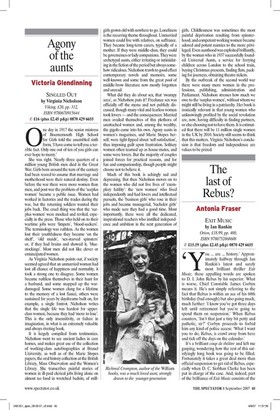Agony of the aunts
Victoria Glendinning SINGLED OUT by Virginia Nicholson Viking, £20, pp. 312, ISBN 9780670915644 £16 (plus £2.45 p&p) 0870 429 6655 ne day in 1917 the senior mistress of Bournemouth High School for Girls told the assembled sixth form, 'I have come to tell you a terrible fact. Only one out of ten of you girls can ever hope to many.'
She was right. Nearly three quarters of a million young British men died in the Great War. Girls born around the turn of the century had been reared to assume that marriage and motherhood were their natural destiny. Even before the war there were more women than men, and post-war the problem of the 'surplus women' became a public issue. Women had worked in factories and the trades during the war, but the returning soldiers wanted their jobs back. The cruel thing was that the 'surplus women' were mocked and reviled, especially in the press. Those who held on to their wartime jobs were 'limpets', `blood-suckers'. The terminology was ruthless. As the women lost their youthfulness they became 'on the shelf', 'old maids', 'sex-starved spinsters' or, if they had brains and showed it, 'bluestockings'. Most men did not like clever or emancipated women.
As Virginia Nicholson points out, if society seemed agreed that an unmarried woman had lost all chance of happiness and normality, it took a strong one to disagree. Some women became ruthless themselves in their hunt for a husband, and some snapped up the wardamaged. Some women clung for a lifetime to the memory of a lost fiancé, others were sustained for years by daydreams built on, for example, a single foxtrot. Nicholson writes that the single life was hardest for upperclass women, because they had 'more to lose'. This is the only insensitivity, or failure in imagination, in what is an extremely valuable and always riveting book.
It is largely compiled from testimonies. Nicholson went to see ancient ladies in care homes, and makes great use of the collection of working-class autobiographies at Brunel University, as well as of the Marie Stopes papers, the oral history collection at the British Library, Mass Observation and the Women's Library. She transcribes painful stories of women in ill-paid clerical jobs living alone on almost no food in wretched bedsits, of millgirls grown old with nowhere to go. Loneliness is the recurring theme throughout. Unmarried women could live with relatives, on suffi-ance. They became long-term carers, typically of a mother. If they were middle-class, they could be governesses or lady companions. They were archetypal aunts, either irritating or intimidating in the fiction of the period but always somehow ridiculous. Nicholson trawls to good effect contemporary novels and memoirs, some well-known and some from the great pool of middle-brow literature now mostly forgotten and unread.
What did they do about sex, that 'swampy area', as Nicholson puts it? Freelance sex was officially off the menu and not publicly discussed, though many vital and fearless women took lovers — and the consequences. Married men availed themselves of this plethora of unattached women and, among the wealthy, the gigolo came into his own. Agony aunts in women's magazines, and Marie Stopes herself, were tight-lipped about `self-satisfaction', thus imposing guilt upon frustration. Solitary women often teamed up as house-mates, and some were lovers. But the majority of couples joined forces for practical reasons, and for fun and companionship, though people might choose not to believe it.
Much of this book is achingly sad and depressing. But then Nicholson moves on to the women who did not live lives of 'exemplary futility': the 'new women' who lived independently and had lovers and intellectual pursuits, the 'business girls' who rose in their jobs and became managerial, 'bachelor girls' who made sure they had a good time. Most importantly, there were all the dedicated, inspirational teachers who instilled independence and ambition in the next generation of girls. Childlessness was sometimes the most painful deprivation resulting from spinsterhood; and competent working women became adored and potent nannies to the more privileged. Even aunthood was exploited brilliantly, by the woman who in 1937 successfully founded Universal Aunts, a service for ferrying children across London to the school train, buying Christmas presents, finding flats, packing for journeys, obtaining theatre tickets.
By the outbreak of the second world war there were many more women in the professions, publishing, administration and Parliament. Nicholson stresses how much we owe to the 'surplus women', without whom we might still be living in a patriarchy. Her book is ironically relevant in that young women who unknowingly profited by the social revolution are, now, having difficulty in finding partners, or else choosing not to have them. It is estimated that there will be 11 million single women in the UK by 2010. Society still seems to think that this matters. Virginia Nicholson's conclusion is that freedom and independence are values to be prized.



































































 Previous page
Previous page